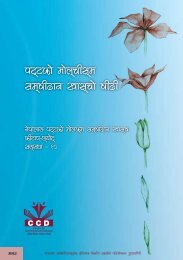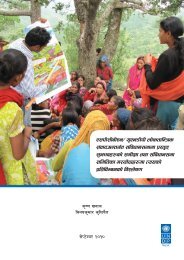English - Support to Participatory Constitution Building in Nepal ...
English - Support to Participatory Constitution Building in Nepal ...
English - Support to Participatory Constitution Building in Nepal ...
You also want an ePaper? Increase the reach of your titles
YUMPU automatically turns print PDFs into web optimized ePapers that Google loves.
2. OVERVIEW OF THE PROPOSED TAMUWAN<br />
PROVINCE FEDERALISM DIALOGUE<br />
The fifth Federalism Dialogue was held <strong>in</strong> Pokhara, capital of proposed<br />
Tamuwan prov<strong>in</strong>ce, from 14 May <strong>to</strong> 16 May 2010. The participants<br />
were from all parts of the proposed Tamuwan terri<strong>to</strong>ry, <strong>in</strong>clud<strong>in</strong>g the<br />
Himalayan districts (Manang and Mustang) and hill districts (Kaski,<br />
Lamjung, Dhad<strong>in</strong>g, and Gorkha). Both the H<strong>in</strong>du castes (Hill Brahm<strong>in</strong>,<br />
Chhetri and Dalit) and the major ethnic groups (Gurung, Magar and<br />
Newar) were represented. The participants came from different walks of<br />
life, and <strong>in</strong>cluded local party leaders, ethnic, Dalit and women activists,<br />
and members of civil society.<br />
The Tamuwan dialogue was significant <strong>in</strong><br />
many aspects.<br />
Informed Debate: Participants had not<br />
read or studied the report of the CA CSRDSP.<br />
Their primary sources of knowledge were,<br />
as noted by the participants of previous<br />
Federalism Dialogues, limited <strong>to</strong> the claims<br />
of ethnic organizations, party propaganda<br />
and/or media report<strong>in</strong>g. The participants felt<br />
the three day Dialogue was significant for:<br />
(a) enabl<strong>in</strong>g them <strong>to</strong> acquire a much greater<br />
degree of <strong>in</strong>formation about the proposed<br />
federal structure, and Tamuwan prov<strong>in</strong>ce <strong>in</strong><br />
particular, (b) assembl<strong>in</strong>g <strong>in</strong>fluential people<br />
from different castes and ethnicities and<br />
political parties liv<strong>in</strong>g <strong>in</strong> different parts of the<br />
proposed terri<strong>to</strong>ry of Tamuwan <strong>to</strong> discuss,<br />
debate, and <strong>in</strong>teract on several critical<br />
issues of federalism, i.e., au<strong>to</strong>nomy, right <strong>to</strong><br />
self determ<strong>in</strong>ation, m<strong>in</strong>ority rights, and (c)<br />
creat<strong>in</strong>g a positive m<strong>in</strong>dset <strong>to</strong> live <strong>to</strong>gether<br />
under the new federal political structure.<br />
Consensus <strong>Build<strong>in</strong>g</strong>: Discussion began<br />
with differences of op<strong>in</strong>ion on the name and<br />
terri<strong>to</strong>ry of the proposed Tamuwan prov<strong>in</strong>ce.<br />
Some participants, particularly from hill<br />
H<strong>in</strong>du high castes and Dalits, objected <strong>to</strong><br />
the name Tamuwan s<strong>in</strong>ce it is associated<br />
with the identity of Gurung ethnicity.<br />
This represented, <strong>in</strong> a larger context, their<br />
opposition <strong>to</strong> “caste/ethnic based federalism”.<br />
They argued that ethnic federalism would<br />
have a negative impact on social harmony,<br />
national unity and <strong>in</strong>tegration. The Janjati<br />
participants also (mis)unders<strong>to</strong>od that the<br />
CSRDSP had adopted the pr<strong>in</strong>ciple of ethnic<br />
federalism. Partially because of the resource<br />
persons’ explanations that the proposed<br />
prov<strong>in</strong>ces were not designed <strong>in</strong> l<strong>in</strong>e with<br />
ethnic federalism and ma<strong>in</strong>ly because of<br />
the agreement <strong>to</strong> remove the claims of<br />
political prime rights (e.g., by Gurung <strong>in</strong><br />
Tamuwan), the participants agreed <strong>to</strong> frame<br />
federal units on the basis of ethnic identity.<br />
Eventually, they endorsed the name of the<br />
prov<strong>in</strong>ce, Tamuwan, as well. This consensus<br />
sends a larger message that compromise<br />
can be achieved <strong>to</strong> mutually reta<strong>in</strong> an ethnic<br />
prov<strong>in</strong>cial name and withdraw the provision<br />
10 Federalism Dialogues Series 5




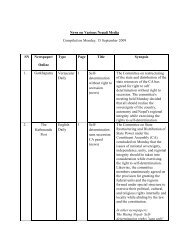

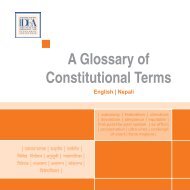
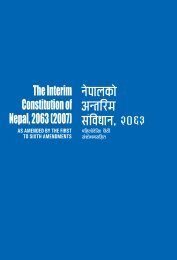
![g]k fnsf blntx? / gofF ;+l jwfg](https://img.yumpu.com/49483602/1/184x260/gk-fnsf-blntx-goff-l-jwfg.jpg?quality=85)
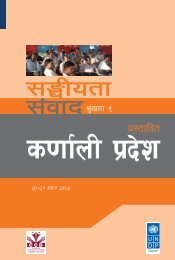
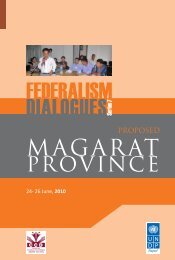
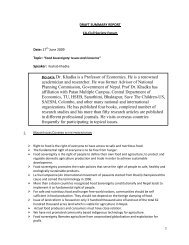
![+ljwfg;ef, /fHosf]k'g](https://img.yumpu.com/41604075/1/184x260/-ljwfgef-fhosfkg.jpg?quality=85)
